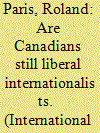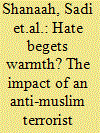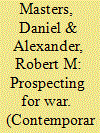|
|
|
Sort Order |
|
|
|
Items / Page
|
|
|
|
|
|
|
| Srl | Item |
| 1 |
ID:
135096


|
|
|
|
|
| Summary/Abstract |
Since coming into office in 2006, the government of Prime Minister Stephen Harper has rejected many of the symbols and practices of the liberal internationalist approach to foreign affairs that Canadian governments of all political stripes broadly embraced during the preceding six decades. As part of this change, the Harper government has also promoted a new narrative about Canada’s history and foreign policy, which encourages Canadians to change how they think about their country and its role in the world. By examining recent opinion surveys, this article asks whether Canadian public attitudes on foreign policy have shifted away from liberal internationalism and toward the Harper government's narrative since 2006.
|
|
|
|
|
|
|
|
|
|
|
|
|
|
|
|
| 2 |
ID:
190908


|
|
|
|
|
| Summary/Abstract |
This article examines the impact of the March 15, 2019 far-right terrorist attack against Muslims in Christchurch, New Zealand on public opinion toward Muslims. It also examines whether the impact of the attack varies for individuals across the political spectrum. We make use of data from the 2019 New Zealand Attitudes and Values Study (N = 47,951) to compare the attitudes of New Zealanders before and after the attack. Using a range of statistical techniques, including regression discontinuity analysis, we find robust evidence that the attack led to an immediate increase in warmth toward Muslims. We also show that this increase was driven by both left-wing/liberal and right-wing/conservative individuals in the immediate days after the attack. Soon after the attack, however, attitudes toward Muslims among the politically conservative population tended to revert to pre-attack levels. By contrast, political liberals maintained their heightened level of positive attitudes for a longer period. We discuss the possible theoretical reasons for these findings.
|
|
|
|
|
|
|
|
|
|
|
|
|
|
|
|
| 3 |
ID:
084936


|
|
|
|
|
| Publication |
2008.
|
| Summary/Abstract |
Abstract Current literature on the foreign policy process focuses almost entirely on elite packaging of foreign policy prospects with little attention to why the general population accepts or rejects their choices. A more complete understanding of the democratic foreign policy process requires knowing the conditions when people will accept elite guidance. We use prospect theory - model of decision-making that suggests people are inclined to escalate risks to avoid or recover losses - in order to understand the way in which context and emotions shape perceptions and support of foreign policy options. Prospect theory helps to explain the significance of elite behaviours such as threat inflation, which are designed to link discrete foreign policy actions to conditions related to intensely emotional events in order to advance a preferred policy. To illustrate the utility of prospect theory to the foreign policy process, we turn to the Iraq War policy process, and why the Bush administration found a receptive audience to its public sale of the war. This study concludes that perceived losses in the security condition of the United States caused by the 9/11 terrorist attacks provided a context used to frame the decision for war with Iraq. The public sale of the war involved efforts by senior officials to link Saddam Hussein to terrorism and 9/11, casting a particular frame that was more likely to win acceptance of risk-seeking behaviour by the public. This, combined with a collapse in elite opposition that could counter-frame the option for war, contributed to an alignment in public perceptions of terrorist threats and support for offensive war with Iraq as a prospect to escape the threat of terrorism.
|
|
|
|
|
|
|
|
|
|
|
|
|
|
|
|
| 4 |
ID:
171417


|
|
|
|
|
| Summary/Abstract |
Climate protection goals can only be achieved if the expansion of renewable energies is publicly supported. This paper analyzes the relevance of the perceived importance of policy goals and framework conditions as well as individual risk, time, and social preferences for the support of the German energy transition. Based on data from an online survey, our empirical analysis reveals that the perceived importance of climate protection, nuclear risks, changes in the landscape and economic effects are decisive for a strong support of the energy transition. In addition, it reveals that the importance of the policy goals is driven by political orientation but also by trust and a feeling of responsibility. Therefore, this study emphasizes the need to compensate for the negative consequences of the transition process, to take confidence-building measures, and to sensitize the public for their own stake in greenhouse gas emissions.
|
|
|
|
|
|
|
|
|
|
|
|
|
|
|
|
|
|
|
|
|